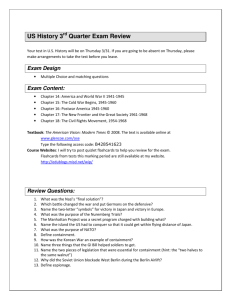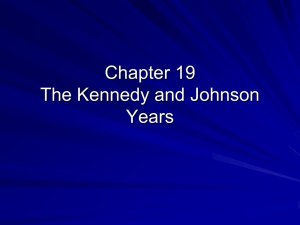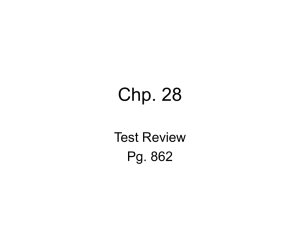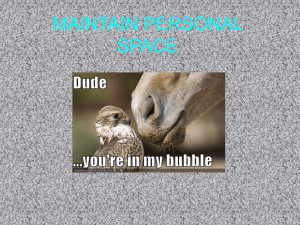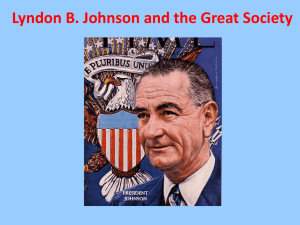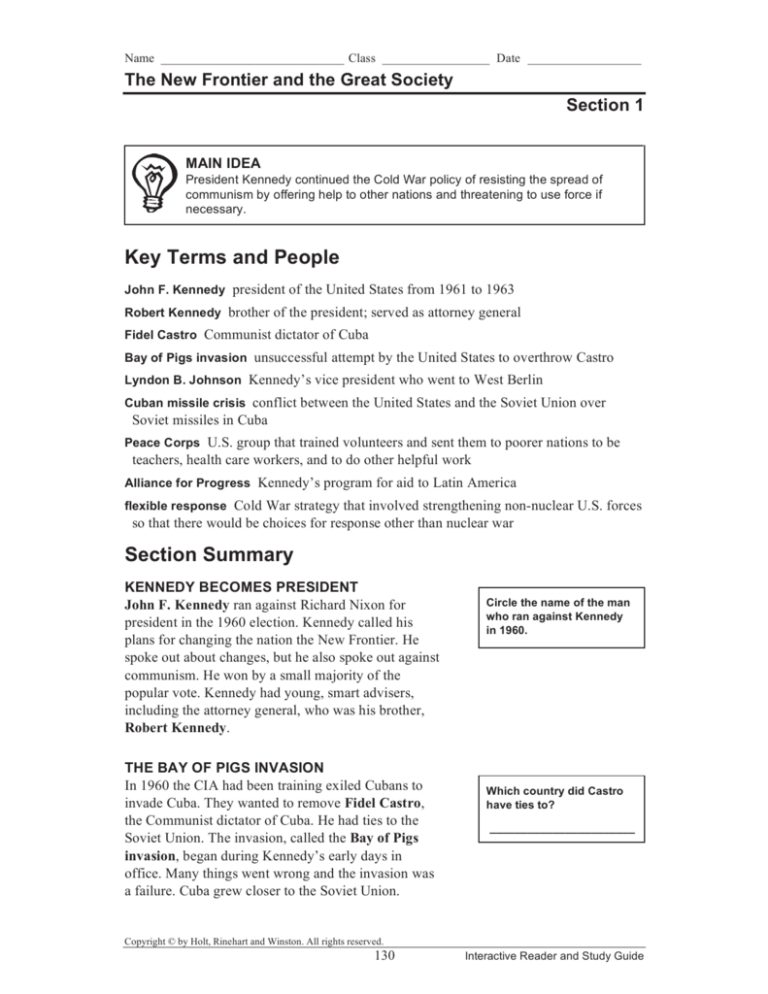
Name _____________________________ Class _________________ Date __________________
The New Frontier and the Great Society
Section 1
MAIN IDEA
President Kennedy continued the Cold War policy of resisting the spread of
communism by offering help to other nations and threatening to use force if
necessary.
Key Terms and People
John F. Kennedy president of the United States from 1961 to 1963
Robert Kennedy brother of the president; served as attorney general
Fidel Castro Communist dictator of Cuba
Bay of Pigs invasion unsuccessful attempt by the United States to overthrow Castro
Lyndon B. Johnson Kennedy’s vice president who went to West Berlin
Cuban missile crisis conflict between the United States and the Soviet Union over
Soviet missiles in Cuba
Peace Corps U.S. group that trained volunteers and sent them to poorer nations to be
teachers, health care workers, and to do other helpful work
Alliance for Progress Kennedy’s program for aid to Latin America
flexible response Cold War strategy that involved strengthening non-nuclear U.S. forces
so that there would be choices for response other than nuclear war
Section Summary
KENNEDY BECOMES PRESIDENT
John F. Kennedy ran against Richard Nixon for
president in the 1960 election. Kennedy called his
plans for changing the nation the New Frontier. He
spoke out about changes, but he also spoke out against
communism. He won by a small majority of the
popular vote. Kennedy had young, smart advisers,
including the attorney general, who was his brother,
Robert Kennedy.
THE BAY OF PIGS INVASION
In 1960 the CIA had been training exiled Cubans to
invade Cuba. They wanted to remove Fidel Castro,
the Communist dictator of Cuba. He had ties to the
Soviet Union. The invasion, called the Bay of Pigs
invasion, began during Kennedy’s early days in
office. Many things went wrong and the invasion was
a failure. Cuba grew closer to the Soviet Union.
Circle the name of the man
who ran against Kennedy
in 1960.
Which country did Castro
have ties to?
_______________________
Copyright © by Holt, Rinehart and Winston. All rights reserved.
130
Interactive Reader and Study Guide
Name _____________________________ Class _________________ Date __________________
The New Frontier and the Great Society
Section 1
THE BERLIN CRISIS
Kennedy met with Nikita Khrushchev, the Soviet
leader, in 1961. Khrushchev demanded that the United
States recognize East Germany as an independent
nation and remove its troops from West Berlin. West
Berlin was an island of freedom surrounded by East
Germany. Kennedy reacted by sending more troops.
Thousands of East Germans were escaping to West
Berlin. To stop them, the East Germans closed the
borders and built a high wall around Berlin. Anyone
caught crossing the wall was shot. Vice President
Lyndon B. Johnson visited West Berlin and told its
people they would not be abandoned. Two years later,
Kennedy, too, visited Berlin and repeated the promise.
THE CUBAN MISSILE CRISIS
The Cuban missile crisis began in October 1963,
when U.S. spy planes found that the U.S.S.R. had put
nuclear missiles in Cuba. These could strike anywhere
in the United States. In response, Kennedy blockaded
Cuba by sea. He put U.S. forces on full alert. Soviet
ships carrying missile parts approached the American
ships. Fortunately, at the last minute they turned back.
Khrushchev agreed to remove the missiles from Cuba
if the United States promised never to invade Cuba.
KENNEDY’S FOREIGN POLICY
Kennedy created several programs to help poorer
nations. The Peace Corps trained volunteers to serve
as teachers and health care workers in poor countries.
The Alliance for Progress gave aid to Latin America.
However, it often tied the aid to anti-Communist
dictators who were not supported by the people.
Kennedy’s strategy was the flexible response. This
meant strengthening non-nuclear forces so there were
choices other than nuclear war.
Why did the East Germans
build a wall around West
Berlin?
_______________________
_______________________
_______________________
The United States and the
Soviet Union almost came
to nuclear war during the
Cuban missile crisis. How
was this avoided?
_______________________
_______________________
Why was Kennedy’s
strategy called “flexible?”
_______________________
_______________________
_______________________
CHALLENGE ACTIVITY
Critical Thinking: Compare and Contrast Conduct some research into
everyday life in East Berlin and West Berlin. How was it the same in both
parts of the city? How was it different?
Copyright © by Holt, Rinehart and Winston. All rights reserved.
131
Interactive Reader and Study Guide
Name _____________________________ Class _________________ Date __________________
The New Frontier and the Great Society
Section 2
MAIN IDEA
John F. Kennedy brought energy, initiative, and important new ideas to the
presidency.
Key Terms and People
Jacqueline Kennedy First Lady to President John F. Kennedy
New Frontier Kennedy’s plans to change the country
mandate permission to act
Earl Warren chief justice of the Supreme Court; author of many important decisions
Warren Court the Supreme Court for the 21 years that Earl Warren was chief justice
Lee Harvey Oswald assassin of President Kennedy
Warren Commission commission led by Earl Warren to investigate Kennedy’s
assassination
Section Summary
KENNEDY’S NEW FRONTIER
Kennedy was skilled at using the media to project the
image he wanted. He showed himself as young and
athletic. Actually, he had many health problems. First
Lady Jacqueline Kennedy was attractive and from a
wealthy family. She supported the arts and made the
White House the nation’s unofficial cultural center.
Kennedy wanted to improve the nation with his
New Frontier plans. However, he did not have a clear
mandate. The election of 1960 was too close to be
seen as permission for him to act. Kennedy urged
Congress to reduce taxes in order to fight
unemployment. He proposed federal aid for education
and creation of a health plan for the elderly. Congress
acted on none of these ideas. Kennedy did convince
Congress to pass financial help for poor areas of the
country. Congress also created a job retraining
program and raised the minimum wage.
In 1961 the Soviet Union caught Americans by
surprise. It launched the first human into space.
Kennedy proposed that within 10 years the United
States should land a human on the moon. The space
race began.
How was Kennedy’s image
different from reality?
_______________________
_______________________
What were three ideas
President Kennedy had to
improve the nation?
_______________________
_______________________
_______________________
Circle the year the first
human was launched into
space.
Copyright © by Holt, Rinehart and Winston. All rights reserved.
132
Interactive Reader and Study Guide
Name _____________________________ Class _________________ Date __________________
The New Frontier and the Great Society
Section 2
THE WARREN COURT
During Kennedy’s presidency, the Supreme Court
made major changes in U.S. society. Led by Chief
Justice Earl Warren, the court made many important
decisions about the laws of the land. The court
became known as the Warren Court. In 1954 the
court banned racial segregation in schools. In 1962 the
court required the states to redraw the boundaries of
their legislative districts when populations changed. In
1964 it decided that a person has a right to a lawyer
during police questioning. The court also prohibited
formal prayers and daily Bible readings in public
schools. The justices said that the government may not
make any one religion the nation’s “official” religion.
THE KENNEDY ASSASSINATION
On November 22, 1963, Kennedy was working to
build support for his re-election campaign in Texas.
He was in Dallas, riding in an open car on his way to
deliver a speech. Suddenly shots were fired and
Kennedy was killed. Within hours, Vice President
Lyndon Johnson was sworn in as the next president.
Just hours after Kennedy was shot, the police
arrested Lee Harvey Oswald, a troubled man with
connections to Cuba and the Soviet Union. As Oswald
was being moved to the county jail, he was shot to
death by Jack Ruby, a man with ties to organized
crime. These occurrences caused people to wonder if
Oswald had acted alone. President Johnson named
Earl Warren to head the Warren Commission to
investigate the assassination. It concluded that Oswald
and Ruby had each acted alone.
Kennedy offered great promise to Americans. In
world affairs he had won friends for the nation
through the Peace Corps and bettered relations with
the Soviet Union. At home, however, he was not able
to accomplish all he set out to do.
Circle the date when the
Supreme Court outlawed
racial segregation in
schools.
Why did the court prohibit
formal prayers in public
schools?
_______________________
_______________________
_______________________
What did the Warren
Commission decide about
the assassination?
_______________________
CHALLENGE ACTIVITY
Critical Thinking: Evaluate Would you rate Kennedy as a successful
president? Write two paragraphs explaining your position.
Copyright © by Holt, Rinehart and Winston. All rights reserved.
133
Interactive Reader and Study Guide
Name _____________________________ Class _________________ Date __________________
The New Frontier and the Great Society
Section 3
MAIN IDEA
President Johnson used his political skills to push Kennedy’s proposals through
Congress and expanded them with his own vision of the Great Society.
Key Terms and People
War on Poverty set of programs designed to reduce poverty in the United States
Job Corps work-training program for unemployed youth of the United States
VISTA Volunteers in Service to America; the domestic Peace Corps
Great Society Johnson’s programs to improve American society
Barry Goldwater Johnson’s opponent in the presidential election of 1964
Medicaid government program to provide free medical care to the poor
Medicare government program to provide medical care to the elderly
Johnson Doctrine foreign policy guideline that called for the United States to step in if a
Communist dictator came to power in Latin America
Pueblo incident capture of a U.S. Navy spy ship by the North Koreans
Section Summary
JOHNSON BECOMES PRESIDENT
Johnson had been a congressman, a senator, and
Senate majority leader. By 1960, when he became
vice president, he had more influence in Washington,
D.C., than any other Democrat. He had great political
skills and great compassion for the underprivileged.
ENACTING KENNEDY’S AGENDA
Johnson told the nation that he would carry on
Kennedy’s programs. He asked Kennedy’s advisers to
stay. One of Kennedy’s plans was to fight poverty.
Johnson called it the War on Poverty and gave it
high priority. He got Congress to pass the Economic
Opportunity Act. It created the Job Corps, a worktraining program for unemployed youth, and VISTA,
Volunteers in Service to America. VISTA was a
domestic Peace Corps. Kennedy’s tax cut bill was
passed and the economy grew while unemployment
fell. Johnson also got Congress to finally pass the
Civil Rights Act.
What positions did
Johnson hold before he
became vice president?
_______________________
_______________________
Underline the programs
first developed by Kennedy
that Johnson got passed.
Copyright © by Holt, Rinehart and Winston. All rights reserved.
134
Interactive Reader and Study Guide
Name _____________________________ Class _________________ Date __________________
The New Frontier and the Great Society
Section 3
THE GREAT SOCIETY
Johnson’s plans for the country went beyond those of
Kennedy. He wanted to create the Great Society, a
society with abundance, liberty, and justice for all. In
the 1964 election, Johnson faced conservative Barry
Goldwater. Goldwater suggested using nuclear
weapons in Vietnam and thought that government
programs to help people were similar to communism.
Johnson won the election by a landslide.
With a mandate to act, Johnson pushed Congress
into action. In 1965 it passed the first large-scale
program of government aid to public schools. Other
programs created the first federal college scholarships
and Head Start, a preschool education program. The
Department of Housing and Urban Development was
created. Congress approved the money for Medicaid.
This provided free health care for poor people.
Medicare, a health care program for the elderly, was
also begun. In 1967 Johnson also signed laws to
improve the environment and to create the
Corporation for Public Broadcasting.
JOHNSON’S FOREIGN POLICY
Progress on the Great Society slowed by the end of
1966. One reason was that the government was
spending $2.5 billion per month on the Vietnam War.
Johnson was determined not to lose ground to the
Communists. In 1965 he had sent troops to the
Dominican Republic to end a revolt. The development
of the Johnson Doctrine said that the United States
had a right to step in if a Communist dictatorship
might be established. In 1967 Johnson signed the first
direct treaty with the Soviet Union in 50 years. Also,
the United States, the Soviet Union, and 58 other
nations agreed to ban weapons in outer space. In a
1968 crisis, the North Koreans captured the U.S. Navy
spy ship Pueblo. Johnson negotiated a settlement for
the Pueblo incident. North Korea released the crew
but kept the ship.
What Great Society
programs were begun
between 1964 and 1967?
_______________________
_______________________
_______________________
_______________________
_______________________
_______________________
To which foreign country
did the United States send
troops in 1965?
_______________________
_______________________
CHALLENGE ACTIVITY
Critical Thinking: Analyze Why do you think Johnson was more
successful than Kennedy at passing new programs through Congress?
Copyright © by Holt, Rinehart and Winston. All rights reserved.
135
Interactive Reader and Study Guide


